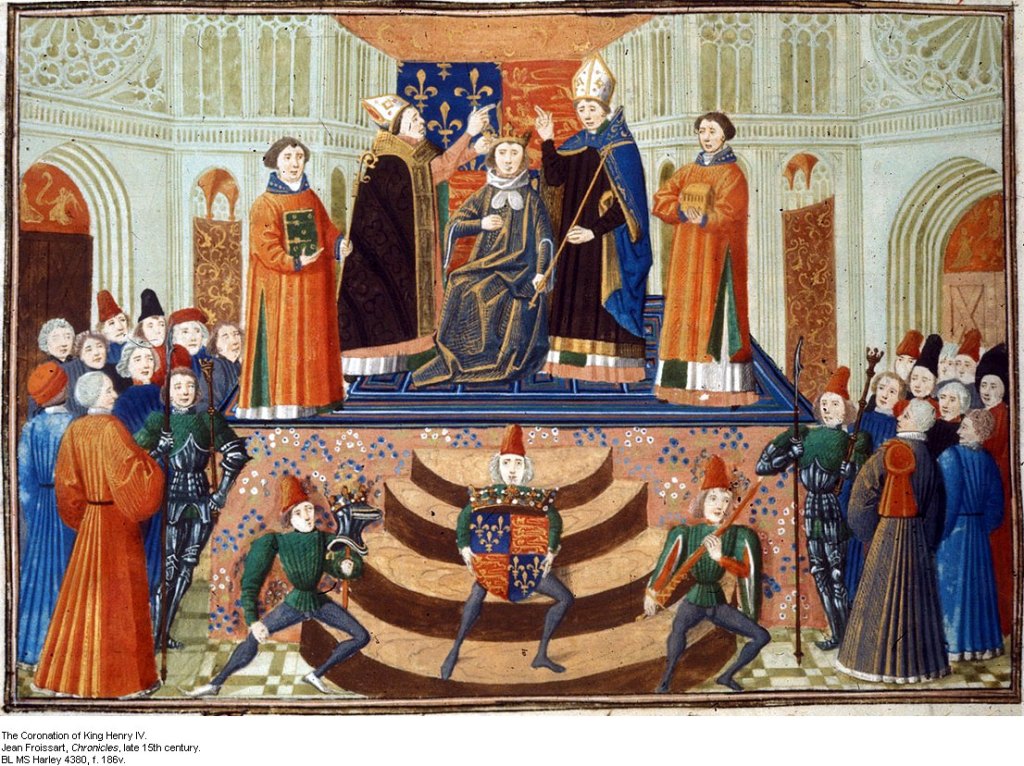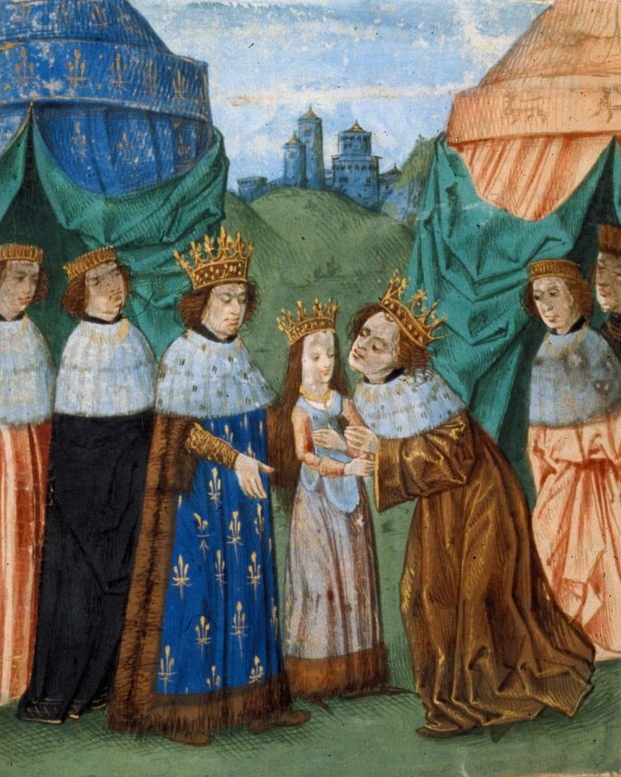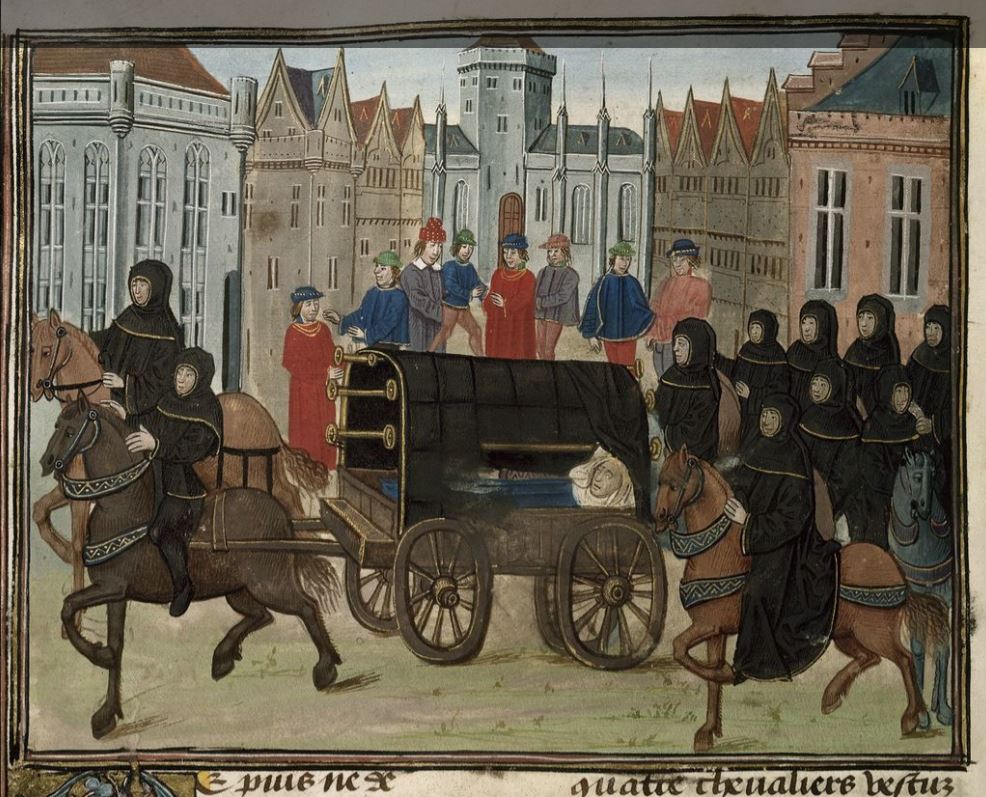Oh dear, here we have 10 “facts” about Richard III’s predecessor namesake, Richard II. Yes, poor old Richard of Bordeaux gets it in the neck yet again. At this rate he’ll soon be Richard III’s equal. Well, maybe not quite, but you know what I mean.
Firstly it’s stated that Richard of Bordeaux was an “ill choice” to be king. Um…he was the legitimate heir to the throne, so not chosen by anyone, except perhaps the Almighty. Then he showed “no interest in governing” – he was 9/10 years old, so it was hardly surprising that he didn’t have a tight grip on what was going on around him! He didn’t suddenly wake up on the day after his coronation knowing all there was to know and be able to handle his clutch of thoroughly ambitious uncles, which included the mighty (and at the time much hated) John of Gaunt . Richard was in these uncles’ hands, ruled by them, not the other way around, and Gaunt was suspected from the outset of having an eye on the throne for himself (and his heirs).
Regarding the so-called Peasants’ Revolt: the suggestion that Richard “holed himself up in the Tower” implies cowardice on his part. This was not so, even though he was only 14. Facing the rebels’ army (they were certainly not all peasants, by any means) he displayed guts and courage, and if his promises to them proved to be hollow, it wasn’t likely to have been his fault. Once again, he was in the hands of others, experienced and powerful men who wanted to cling to the way things were before the populace revolted. Richard had no real power but was simply a figurehead.
Then the list has it that he and Anne of Bohemia fell in love and “decided to get married”. Um…no, the marriage was arranged and then they fell in love. He was indeed devastated by her sudden death, which the list does at least get right.
Finally, after Anne’s death he married a 6-year-old French princess, which was “creepy”. Maybe to our modern eyes, but certainly not back in the 14th century. Magnates even arranged marriages for babes in arms. Royal marriages were almost always political, with a view to international alliances and so on, and Richard wanted peace with the eternal enemy, France. He treated his new little queen, Isabelle of France , very well indeed, with gentleness and kindness, and certainly without any notion at all of consummating the match until she was of age.
Did he end up a tyrannical maniac? I don’t think so. From the very beginning Richard II hadn’t had a chance to develop normally. His father, the great “Black Prince” should have become king on the death of his father Edward III. Instead he pre-deceased Edward leaving one small boy as Edward’s and England’s heir.
Richard was manipulated cynically from the outset of his reign. To make matters worse, he wasn’t a warrior by nature. He wanted peace, the development of arts and so on. In that he was way ahead of his time. But the aristocracy wanted war. The defeat of France and other enemies was an overriding consideration for them. Peace with France was Richard’s desire.
It would have taken a man of a very different character from Richard II to have grown up “normally” in the face of such constant adversity. He took refuge in doubtful friends and favourites, maybe because he had a very human need for people of his own around him, not those who were really his uncles’ cronies? Perhaps that was even a factor in the immense depth of his love for Anne. They were together against the world, so to speak. If he did eventually flip, as the modern expression has it, then I fear it wasn’t really surprising.

He was overthrown by his first cousin, Henry of Bolingbroke, http://www.bbc.co.uk/history/historic_figures/henry_iv_king.shtml Duke of Lancaster, the son and heir of John of Gaunt. As the new Henry IV, Bolingbroke wasted no time about ridding himself of the awkwardness of an anointed king. Richard died mysteriously in Pontefract, maybe by starvation, maybe by poisoning. It’s not known.
What might have happened if Richard’s second marriage had been to a queen who was of age? He and Anne of Bohemia had no children, although she reported miscarriages, so it wasn’t the platonic marriage some stories suggest. If Isabelle of France had been old enough, and had given Richard the vital heir, what then? Did Henry of Bolingbroke always harbour ambition for the throne? His father, John of Gaunt, was certainly believed to have done, and maybe he’d instilled the same goal in his son.
Might Henry have rebelled anyway, whether Richard had a direct heir or not? The Dukes of Lancaster were fabulously wealthy and powerful, but Richard’s position would have been infinitely stronger if he’d had a son. In this respect I think Richard II’s position was a distant echo of what was to come for Richard III. Maybe with the king having the security of an heir, neither this earlier Henry — nor the Henry Tudor of the future — would have rallied the support he actually did.
Did Richard II deserve his fate? I don’t think so, but he was “damaged goods”—damaged by everything that had happened to him from childhood, and by his own inner self. I feel sympathy for him. He wanted things to be different, and he tried hard to achieve this, but the tediously long battle went against him.
Did England deserve Henry IV? No.







A list of more ‘facts’, it’s no surprise any more that our history is so skewed, and is taught so badly. When Shakespeare is considered the guru of history, instead of just a writer, and all the lists of facts by anyone who has desires to call themselves historian, our true history is in danger of disappearing forever.
LikeLiked by 3 people
I don’t know if it’s still a raging discussion in Britain, but over here, poor ole Shakespeare is a ripe topic for “who wrote” Shakespeare (heehee). A fairly prominent lawyer (for the defense) favors Sir Francis Bacon and has done quite the enthusiastic podcast on his behalf. I rather like Bacon myself, if not as the Bard’s ultimate author, then for getting it right about why Richard still “stirred the lees in men’s hearts”
what does it say about Shakespeare’s veracity when even his authorship and identity is questioned? (or am I just being an errant colonial!?!)
LikeLiked by 1 person
Well said!
LikeLike
Agreed, Glenis.
LikeLiked by 2 people
Richard II’s poor reputation has been strongly influence by Shakespeare’s play about him, written nearly 200 years after his death. When parliament met in the fall of 1381 several months after the Peasants’ Revolt 14-year-old Richard informed the Commons that he was willing abolish serfdom. The Commons however retorted that they would not stand for it. In later years Richard refused their request to forbid serfs’ sons from educational opportunities. Recent research has turned up a letter written by Anne of Bohemia to her brother in which she said she had not yet “conceived” and records indicate she was taking herbal treatments for infertility so she and Richard clearly did not have a sexless marriage. Richard II, like Elizabeth I, had no reason to quickly nominate a successor–particularly since he would have just passed his 33rd birthday when he died and still had time to father an heir if he himself was not suffering from infertility issues (such a a case of mumps). Like Elizabeth he probably felt naming an heir might encourage some people to hasten the next succession. Christopher Fletcher has questioned Richard’s reputation as a peacenik and pointed out that he led an expedition to Scotland and two to Ireland (the second being interrupted by his exiled cousin’s return). Richard was one of the very few English monarchs to show much interest in Ireland and its political problems. Also, Fletcher and Anne Curry point out that contrary to the constantly repeated statement that Richard exiled his cousin Henry for life after John of Gaunt’s death, the documentary evidence shows that Henry was expected to eventually return and claim his estate. The massive Duchy of Lancaster was put in the kind of trust that was used when an heir was a minor, not seized lock, stock, and barrel into the king’s hands. The evidence also strongly suggests that Henry had started planning on seizing the crown while he was in France; he later pointed out to the Duc d’Orleans (King Charles VI’s younger brother) that he (Orleans) knew of his plans then and approved them. While in France Henry met up with Richard’s hated enemy, Thomas (Fitzalan) Arundel, former Archbishop of Canterbury, whom Richard had exiled in 1397. Henry had been explicitly ordered not to meet with Arundel and doing so was treason. Some more recent historians believe that the intelligent and politically-savvy Arundel was the “brains” behind Henry’s invasion and usurpation. After Henry became king he arranged that the Duchy of Lancaster would not be expected to pay towards the kingdom of England’s expenses; probably a surprise to those people who that that he would be so rich that he wouldn’t need to raise taxes (many people had the impression that he said he would not collect taxes. On the contrary, he eventually raised far more in taxation than his dead cousin)
LikeLiked by 3 people
To add grist to your mill Roberta, I have been perusing T B Pugh’s Henry V and the Southampton Plot, (1988) and the author does not spare either the “founder” of the Lancastrian dynasty nor his son – the writing style is terse at best (which I like) and summations often run like this, “the first Lancastrian king spent the early years of his reign struggling for survival and the House of Lancaster ruled England for less than sixty years …” to which I would add this sounds dire indeed, until one remembers that the Tudor line, in the male, lasted a scant sixty-eight years so perhaps Pugh is a bit harsh, or modern apologists are simply cowed by Tudor brilliance? yes, I am being sarcastic, Pugh lists H4 as “always incompetent in money matters (which led to) a lasting tradition of bad Lancastrian government finance … their legacy was always debt and deficit” – the rebellion of Owain Glyn Dwr gets his own chapter later, and while the analysis is good it fails to mention that Sir Edmund Mortimer’s wife, Catrin, and their young daughter’s were all sent as prisoners to the Tower after Mortimer’s death at Harlech, along with Owain’s wife, of the wife Catrin we know she died with her daughters in the Tower, when and why I have not been able to discover and perhaps that is why Pugh also did not bother to detail this in the section about Henry’s dealings with Wales – the focus was on the back story for the Southampton Plot and here how it connected to Hotspur’s equally rebellious reaction but in the north (he was married to another Mortimer). But, the comments about Archbishop Scrope puts paid to any mystique, I think, about the whole of the Lancastrian dynasty, “(Scrope) was neither rebel nor a traitor and his judicial murder was the gravest mistake that H4 make; even Richard II in the last years of his reign had NEVER acted with such disregard of legal formalities” – I think we can all find a parallel with this murder by his Lancastrian descendant in 1499.
BTW, if anyone knows, or has seen, the actual trial records of Edward of Warwick from 1499, I would appreciate knowing how to access them, OR, if anyone knows if Edward ever had even one tutor in all those 14 years in captivity in the Tower that too would be of much interest to me, thanks.
LikeLiked by 1 person
Well put! I read T.B. Pugh’s book many years ago and was surprised by the muted reaction to it from academia at the time (1980s) even though the author was an academic. Maybe the Victorian cult of “Lancastrian constitutionalism” was still in effect? Some authors have said the nineteenth century hung on in academia up to the 1970s (at least) in British history departments (not to mention American ones)
LikeLiked by 3 people
Excellently expressed, Roberta. Richard needs more champions!
LikeLiked by 1 person
Why, thank you!
LikeLiked by 1 person
every discipline has their sacred cows, and for English History it is by far the disreputable Tudors, basically a spindly, near toothless man with three infertile grandchildren who all lived perilously in glass houses
Rage on Tudor apologists, you’ve had to cover for these wretches since Henry Percy felt the wrath of his own northern retainers in April 1489, or as poet John Skelton said it, “…what kindeled the wild fyr that made al this smoke …(was that HP’s men) were lynked with a double chaine, and held with the comones vnder a cloke ” – or, as the Great Chronicle of London more bluntly put it, Northumberland was murdered because the commons bore him ‘dedly malyce ffor the dysapoyntyng of kyng Rychard at Bosworth ffeeld’ – and this cited by none other than Hicks in his Richard III and his Rivals (1991, p.367; but not to worry, he plodded on to refute the murder had anything to do with the betrayal of Richard) Sacred cows will be served! Damn the evidence!
LikeLiked by 2 people
“…every discipline has their sacred cows, and for English History it is by far the disreputable Tudors, basically a spindly, near toothless man with three infertile grandchildren who all lived perilously in glass houses….”
Brilliant description. I love it! 😄
LikeLike
Amma, that’s such a brilliant description of Tudor!
LikeLiked by 1 person
Viscountessw and Glennis, my better angels were with me for my comment about that poseur, H7.
Henry, bless his dessicated heart, was the true heir to French king, Louis XI, of whom I have spent probably too much time researching. It was not Charles, the dim witted son who bungled the Treaty at Etaples (oh what I could say about that screw up!) nor the daughter Anne, of whom Louis described as the “least insane woman in France” – yes, she was a carbon copy of daddy, just without his charm, (I’m not being sarcastic, LXI did have that Gallic arched eyebrow wit, daughter only the scowl, look at her portraits!)
Just put the Treaties of Redon and Etaples side by side and look for yourself, in no way would LXI have handled the nonsense demands (demands!) from H7 concerning Warbeck – as his son, now emancipated from the regency (at 21!) quivered and shook as a measley 12,000 troops move from Calais to Boulogne! My mind reels at the delicious counter measures Louis would have planned for Tudor, if not outright dangled forged letters, reams of missives to the Pope complaining about this outrage, even some hints of assassination, ah the good old days … the easiest solution to such an affront would be the same approach taken in 1477, and send the (now) Chief Commander of the kingdom, Philippe de Crevecoeur to chase them back into Calais (or the sea) just as he did against Hastings at the earlier Siege of Boulogne (when Crevecoeur was just happy to be retained as governor of Picardy by his new boss LXI)
but, say what you will, LXI had panache, that old stick Tudor? not so much …
LikeLiked by 1 person